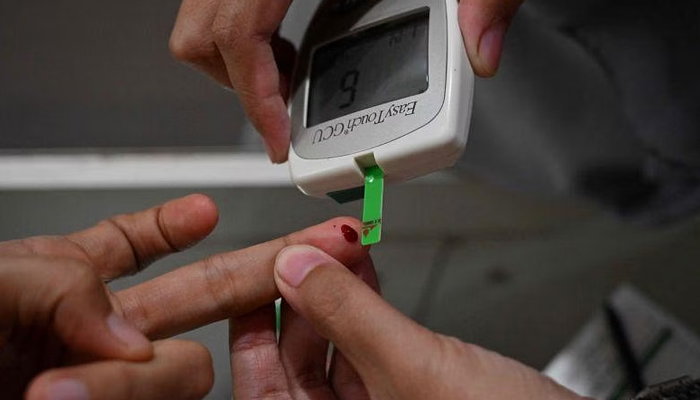Sickly sweet
World Diabetes Day, marked annually on November 14, is an opportunity for us to reflect on Pakistan’s ignominious position as the country with the highest national prevalence of diabetes in the world, with an estimated one in every four Pakistani adults living with diabetes according to the International Diabetes Foundation (IDF). Only China and India, the two most populous countries in the world, have more people living with diabetes than Pakistan. One of the major aims of World Diabetes Day is to take “coordinated and concerted actions to confront diabetes as a critical global health issue”, and the theme of this year’s World Diabetes Day is Access to Diabetes Care. Access to good healthcare is exceedingly scarce in this country and is among the main drivers of our diabetes epidemic. Diabetes patients require regular monitoring and medication, something our woefully under-equipped and understaffed healthcare system is often unable to provide, particularly to the poor and those living in more remote areas. The rising cost of medicine is only exacerbating the problem and experts have warned that Pakistan could set a new record for diabetes deaths this year, surpassing 400,000 deaths from the illness in 2021.
While addressing the inequities of our healthcare system and how our economic crisis is preventing us from meeting the population’s healthcare needs are essential steps, reports say that the increasing prevalence of diabetes in Pakistan is a relatively recent problem with death and disability due to diabetes jumping 87 per cent between 2009 and 2019. The same cannot be said for the problems in our healthcare system or even economic problems. Hence, dealing with the diabetes problem requires looking more closely at the more recent changes in our lifestyle and environment. One will quickly note that while the availability of highly processed and sugary fast foods and drinks has increased there has not been a corresponding increase in our levels of exercise or the urgency with which we encourage people to pursue healthy lifestyles.
This means more efforts need to be channelled into encouraging people to lead healthier lifestyles. This must go beyond simply encouraging people to eat healthier and run around a bit more. The state actually has to get behind making sure the facilities for people of all ages to exercise are widely available and that serious efforts are made into improving availability and affordability of healthier eating options. The young are a particularly key demographic when it comes to tackling this problem given the widespread availability of unhealthy snacks and drinks targeted towards young people. Our schools will need to pursue good physical health and fitness among their students just as intently as they focus on good grades and test scores. These priorities must reflect in the attitudes of parents as well. This does not mean that we can tackle diabetes without a more robust healthcare system, only that this will need to be complemented by equally robust changes to our lifestyles.
-
 Worst Cricket Moments That Shocked The Game
Worst Cricket Moments That Shocked The Game -
 Prince Harry, Meghan Markle Reach A Crossroads: ‘You Could Lose Everything’
Prince Harry, Meghan Markle Reach A Crossroads: ‘You Could Lose Everything’ -
 F1 Title Race: Who Will Win 2026 Drivers’ And Constructors’ Championships?
F1 Title Race: Who Will Win 2026 Drivers’ And Constructors’ Championships? -
 New Observatory Sends 800,000 Asteroid Alerts In One Night
New Observatory Sends 800,000 Asteroid Alerts In One Night -
 Cher’s Son Elijah Blue Allman Apprehended On Two Counts Of Assault At Elite Prep School
Cher’s Son Elijah Blue Allman Apprehended On Two Counts Of Assault At Elite Prep School -
 Beatrice, Eugenie Now Face Andrew, Sarah's ‘nightmares’: 'They're Hugely Conflicted'
Beatrice, Eugenie Now Face Andrew, Sarah's ‘nightmares’: 'They're Hugely Conflicted' -
 X Debuts Topic Filtering To Help Users Shape Their ‘For You’ Recommendations
X Debuts Topic Filtering To Help Users Shape Their ‘For You’ Recommendations -
 Scientists Built World's First Computer That Learns Like Human Brain
Scientists Built World's First Computer That Learns Like Human Brain -
 Robert Carradine’s Daughter Makes Bombshell Confession As Actor's Death Cause Confirmed
Robert Carradine’s Daughter Makes Bombshell Confession As Actor's Death Cause Confirmed -
 Beatrice, Eugenie Put On Blast: ‘Only Nitwits Wouldn’t See An Association With A Pedophile As Toxic’
Beatrice, Eugenie Put On Blast: ‘Only Nitwits Wouldn’t See An Association With A Pedophile As Toxic’ -
 OpenAI Defies Industry Pressure, Secures Guardrails Under New US Defense Department Pact
OpenAI Defies Industry Pressure, Secures Guardrails Under New US Defense Department Pact -
 'Sinners' Delroy Lindo Breaks Silence On BAFTA's Tourette’s Incident At NAACP Image Awards
'Sinners' Delroy Lindo Breaks Silence On BAFTA's Tourette’s Incident At NAACP Image Awards -
 Billy Joel Admits Cancelling Of Tour Due To Brain Disorder 'sounds A Lot Worse' Than It Is
Billy Joel Admits Cancelling Of Tour Due To Brain Disorder 'sounds A Lot Worse' Than It Is -
 US And Israeli Strikes On Iran: Everything You Need To Know
US And Israeli Strikes On Iran: Everything You Need To Know -
 US Strikes On Iran Ignite Emergency Push For Powers Legislation: Report
US Strikes On Iran Ignite Emergency Push For Powers Legislation: Report -
 Kelly Osbourne's Mom Sharon Receives 'shut Up' Call Accepting An Award For Late Hubby?
Kelly Osbourne's Mom Sharon Receives 'shut Up' Call Accepting An Award For Late Hubby?




